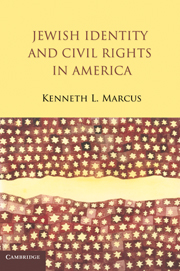Book contents
- Frontmatter
- Contents
- Acknowledgments
- Introduction
- 1 The Dilemma of Jewish Difference
- 2 The Jewish Question in Civil Rights Enforcement
- 3 The New Campus Anti-Semitism
- 4 Criticism
- 5 First Amendment Issues
- 6 Misunderstanding Jews and Jew Hatred
- 7 Institutional Resistance
- 8 The Originalist Approach
- 9 Scientific Theories
- 10 Social Perception
- 11 The Subjective Approach
- 12 Anti-Semitism as Harm to Racial Identity
- Conclusion
- Index
- References
Introduction
Published online by Cambridge University Press: 05 June 2012
- Frontmatter
- Contents
- Acknowledgments
- Introduction
- 1 The Dilemma of Jewish Difference
- 2 The Jewish Question in Civil Rights Enforcement
- 3 The New Campus Anti-Semitism
- 4 Criticism
- 5 First Amendment Issues
- 6 Misunderstanding Jews and Jew Hatred
- 7 Institutional Resistance
- 8 The Originalist Approach
- 9 Scientific Theories
- 10 Social Perception
- 11 The Subjective Approach
- 12 Anti-Semitism as Harm to Racial Identity
- Conclusion
- Index
- References
Summary
During the waning days of 2009, the Jewish world was torn over the case of a 12-year-old English boy whose application for admission to the prestigious North London Jewish School had been declined. Identified in court documents only as “M,” the boy was rejected because the school (confusingly known as “JFS”) did not recognize the validity of his mother’s non-Orthodox conversion. M’s parents sued the school, taking his case all the way to the United Kingdom’s highest court. Sitting on this case, Lord Kerr observed that the “basic question” on appeal could be stated simply: “Was M treated less favourably on racial grounds?” Yet this simple question turns out to be exceedingly difficult. In the New York Times’ assessment, “The questions before the judges in Courtroom No. 1 of Britain’s Supreme Court were as ancient and as complex as Judaism itself. Who is a Jew? And who gets to decide?” True enough.
But of all the ways in which this “ancient” and “complex” question could be raised, why did M’s lawyers frame his complaint in terms of race? To the modern mind, the idea of a “Jewish race” recalls nothing so forcefully as the catastrophic experience of twentieth-century Nazi racial science and its antecedent forms of nineteenth-century pseudoscience. Under English law, however, even state-funded religious schools may give admissions preferences, when oversubscribed, to students who share their faith. What they may not do is discriminate on the basis of race. Hence M claimed racial discrimination based on his mother’s gentile ancestry. But are Jews a “race?” And is discrimination against Jews (or gentiles) “racial?” “The difficulty of the present case,” Lord Mance observed, “is that the word ‘Jewish’ may refer to a people, race, or ethnic group and/or to membership of a religion.”
- Type
- Chapter
- Information
- Jewish Identity and Civil Rights in America , pp. 1 - 16Publisher: Cambridge University PressPrint publication year: 2010



